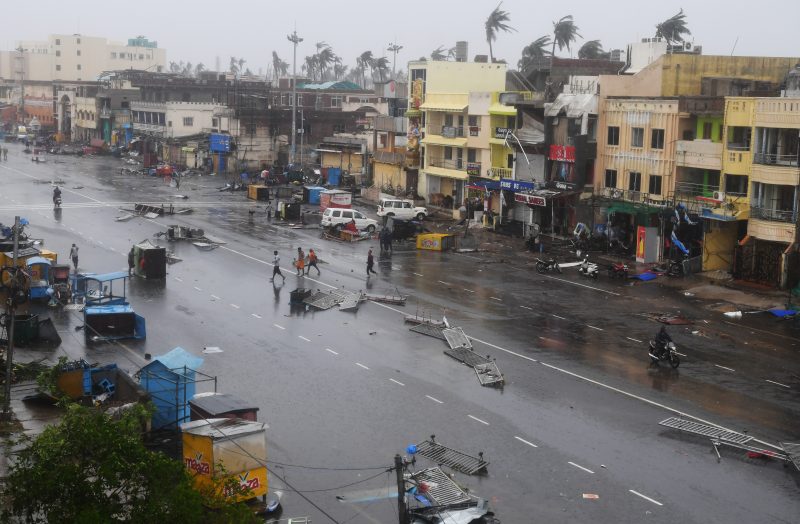Cyclone targets major Indian city on coastal rampage
Indian residents inspect damage on a street in Puri in the eastern state of Odisha after Cyclone Fani made landfall (Dibyangshu SARKAR)
Kolkata (AFP) – Cyclone Fani headed for the major Indian city of Kolkata on Saturday after leaving a trail of deadly destruction along the country’s east coast.
Fani, one of the most powerful storms to come out of the Bay of Bengal in the past decade, has reportedly killed at least eight people in India and one person in Bangladesh — some hit by flying trees and lumps of concrete carried by ferocious winds.
While weakening, the storm — which had packed winds of 200 kilometres (125 miles) an hour — lashed torrential rain onto Kolkata, and its normally packed streets were empty ahead of the arrival of Fani, which means ‘snake’ in the Bengali language.
The international airport in the city of five million people was ordered closed. Train services were also halted.
The storm moved north into West Bengal state from neighbouring Odisha, where more than one million people were moved away from coastal areas.
Eight people were killed in Odisha, the Press Trust of India (PTI) news agency reported, including a teenage boy crushed under a tree and a woman hit by concrete debris.
Authorities in Bangladesh, next in Fani’s path, said a woman was killed by a tree, and that 14 villages were inundated as a tidal surge breached flood dams even before the storm arrived.
Some 400,000 people have been taken to shelters, officials told AFP.
While not confirming any deaths, Odisha disaster management official Prabhat Mahapatra told AFP there were about 160 people injured in the Hindu pilgrimage city of Puri alone.
The storm made landfall just south of Puri and immediately tore up trees and flimsy thatched roof homes.
– ‘The wind is deafening’ –
“It just went dark and then suddenly we could barely see five metres in front of us,” said one Puri resident.
“There were roadside food carts, store signs all flying by in the air,” the man told AFP. “The wind is deafening.”
PTI reported that a construction crane collapsed and that a police booth was dragged 60 metres (yards) by the wind.
As Fani headed northeast, Odisha authorities battled to remove fallen trees and other debris strewn over roads and to restore phone and internet services.
Electricity pylons were down, tin roofs were ripped off and windows on many buildings were smashed.
Puri’s famous 12th-century Jagannath temple escaped damage however.
Gouranga Malick, 48, was solemnly picking up bricks after the small two-room house he shared with his six-strong family collapsed, its roof blown away.
“I have never witnessed this type of devastation in my lifetime,” he told AFP.
“Energy infrastructure has been completely destroyed,” Odisha’s chief minister Naveen Patnaik said.
– ‘Trying to survive’ –
In Kolkata, many businesses took precautions ahead of the storm’s arrival.
Shopping malls shut and hawkers moved their stalls off the roads. Only a few vehicles packed with people heading home plied the roads.
Subrata Das, manager of the AXIS Mall, said: “We have seen how the cyclone ravaged some buildings in Bhubaneswar. We don’t want to take any risk. We are trying to survive the cyclone.”
“If we don’t take our things, we fear the cyclone will raze everything,” said Murad Hussain, 45, who runs a stall.
“We are monitoring the situation 24/7 and doing all it takes… Be alert, take care and stay safe for the next two days,” West Bengal’s chief minister Mamata Banerjee tweeted.
The winds were felt as far away as Mount Everest, with tents blown away at Camp 2 at 6,400 metres (21,000 feet) and Nepali authorities cautioning helicopters against flying.
Ports have been closed but the Indian Navy has sent warships to the region to help if needed. Hundreds of workers were taken off offshore oil rigs.
“We are mooring our boat because it’s the only means of income for us. Only Allah knows when we can go back to fishing again,” Akbar Ali, a fisherman near the town of Dacope in Bangladesh, told AFP while battling surging waves to tie his boat to a tree.
burs/tw/sst
Disclaimer: Validity of the above story is for 7 Days from original date of publishing. Source: AFP.


